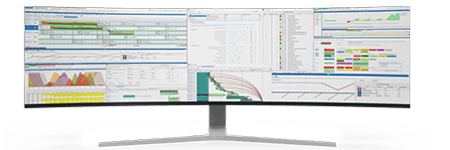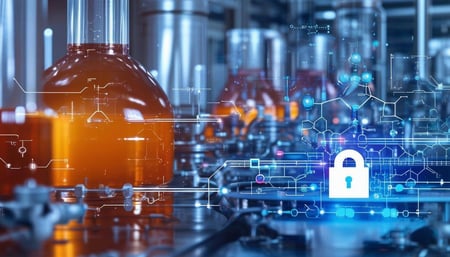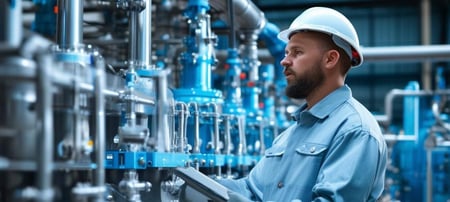Enhancing Security in Chemical Manufacturing
In the chemical manufacturing industry, the convergence of operational technology (OT) and information technology (IT) presents both opportunities and challenges. On one hand, integration of systems like PlanetTogether with enterprise platforms such as SAP, Oracle, Microsoft, Kinaxis, and Aveva enables streamlined operations, improved decision-making, and enhanced productivity. On the other hand, this integration increases the attack surface, making robust security protocols imperative.
As a Manufacturing IT Manager in a chemical manufacturing facility, you're at the forefront of balancing operational efficiency with cybersecurity.
This blog explores how system integration impacts security and how adopting a comprehensive, secure approach to integration can help your organization thrive in a connected and threat-prone world.

The Security Challenges of Chemical Manufacturing
Chemical manufacturing facilities are classified as critical infrastructure, making them prime targets for cyberattacks. Threat actors, ranging from cybercriminals to state-sponsored hackers, are interested in disrupting operations, stealing intellectual property, or compromising safety.
Key Security Risks:
Legacy Systems: Many chemical manufacturing facilities operate with a mix of legacy and modern systems. Integrating legacy OT with modern IT platforms introduces vulnerabilities that attackers can exploit.
Data Flow Across Platforms: Integrating systems such as PlanetTogether with SAP, Oracle, or Aveva requires seamless data flow between production planning, enterprise resource planning (ERP), and manufacturing execution systems (MES). Without proper safeguards, these data exchanges can become entry points for attackers.
IoT and IIoT Devices: Connected sensors and Industrial Internet of Things (IIoT) devices provide valuable data but often lack built-in security features, making them vulnerable to breaches.
Human Factor: Phishing, social engineering, and insider threats remain common. Employees interacting with integrated systems need constant training to avoid inadvertently exposing vulnerabilities.
![]()

The Role of Integration in Enhancing Security
Integration platforms like PlanetTogether empower chemical manufacturers by aligning production schedules, optimizing workflows, and reducing downtime. When integrated with robust enterprise systems such as SAP or Oracle, the potential for operational gains is vast. However, the security of these integrated environments depends on proactive measures.
Unified View of Data
Integration enables a unified view of operations, making it easier to identify anomalies and potential security breaches. For instance:
Integration with SAP: Centralized data management in SAP provides comprehensive insights into production schedules managed by PlanetTogether. This centralized visibility can help detect unauthorized access attempts or unusual data modifications.
Integration with Aveva: Aveva’s focus on industrial systems complements PlanetTogether’s production planning. Together, they enable real-time monitoring of equipment and operations, enhancing the detection of potential cyber threats.
Enhanced Compliance Management
Chemical manufacturing is heavily regulated. Integration allows for better tracking and reporting of compliance-related data:
Microsoft Integration: Using Microsoft’s Azure for cloud-hosted data management ensures adherence to data protection standards like GDPR and industry-specific regulations such as OSHA and REACH.
Kinaxis Integration: Kinaxis supports supply chain compliance by ensuring that data from every stage of production planning aligns with regulatory requirements, reducing the risk of non-compliance.
Secure Data Flow and Storage
Advanced integrations prioritize secure data transfer protocols:
End-to-end encryption of data exchanged between PlanetTogether and Oracle ERP minimizes the risk of interception during transmission.
Leveraging cloud-based solutions from providers like Microsoft enhances data security through advanced firewalls, multi-factor authentication, and regular security updates.

Best Practices for Enhancing Security During Integration
While system integration offers immense benefits, it must be approached with a security-first mindset. Here are actionable steps to enhance security during integration:
Conduct a Comprehensive Risk Assessment
Before integrating systems, assess the vulnerabilities of both existing infrastructure and the platforms to be integrated. Identify potential threats and design a risk mitigation strategy.
Implement Zero Trust Architecture
Adopt a Zero Trust approach, ensuring that no entity—internal or external—is trusted by default. This includes:
Strong authentication for all users accessing PlanetTogether, SAP, or Aveva systems.
Network segmentation to isolate critical systems from less secure components.
Use Secure APIs
Application Programming Interfaces (APIs) are the backbone of integration. Use APIs that enforce strict authentication, encryption, and validation protocols to protect data exchanges between systems.
Leverage Advanced Analytics
Integrated systems generate vast amounts of data. Use predictive analytics and AI tools to detect patterns indicative of security threats. For example:
Oracle Fusion Analytics: When combined with PlanetTogether’s production data, it can identify potential vulnerabilities in supply chain or production processes.
Regular Patching and Updates
Ensure that all integrated platforms are updated with the latest security patches. This includes both software updates for systems like Microsoft Dynamics and firmware updates for connected IIoT devices.
Employee Training and Awareness
Educate employees about the security implications of system integration. Conduct regular drills and provide training on identifying phishing attempts, managing access credentials, and reporting anomalies.

Future Trends in Secure Integration
The evolution of technology will continue to shape the integration landscape in chemical manufacturing. Key trends to watch include:
Blockchain for Data Security: Blockchain technology ensures immutable records of transactions and data exchanges, enhancing the trustworthiness of integrated systems.
AI-Driven Threat Detection: AI tools will become more adept at identifying and neutralizing threats across integrated platforms.
Edge Computing: Processing data at the edge minimizes latency and reduces the amount of sensitive data transmitted across networks, improving security.
Integration of OT and IT Security: Platforms like Aveva, when integrated with PlanetTogether, will focus on harmonizing OT and IT security measures for holistic protection.
Enhancing security in a chemical manufacturing facility isn’t just about defending against external threats—it’s about ensuring the reliability, compliance, and safety of your operations. The integration of systems like PlanetTogether with enterprise platforms such as SAP, Oracle, Microsoft, Kinaxis, and Aveva offers unparalleled opportunities for efficiency, but these gains must be underpinned by robust security strategies.
As a Manufacturing IT Manager, your role is pivotal in creating a secure, integrated environment that not only withstands cyber threats but also drives innovation and operational excellence. By adopting best practices, leveraging cutting-edge tools, and fostering a culture of security awareness, you can ensure that your facility remains resilient in the face of evolving challenges.
Are you ready to take your manufacturing operations to the next level? Contact us today to learn more about how PlanetTogether can help you achieve your goals and drive success in your industry.
Embrace integration. Prioritize security. Lead your facility into the future.
Topics: PlanetTogether Software, Integrating PlanetTogether, Chemical Manufacturing, Unified View of Data, Enhanced Compliance Management, Secure Data Flow and Storage, Conduct a Comprehensive Risk Assessment, Implement Zero Trust Architecture





















LEAVE A COMMENT